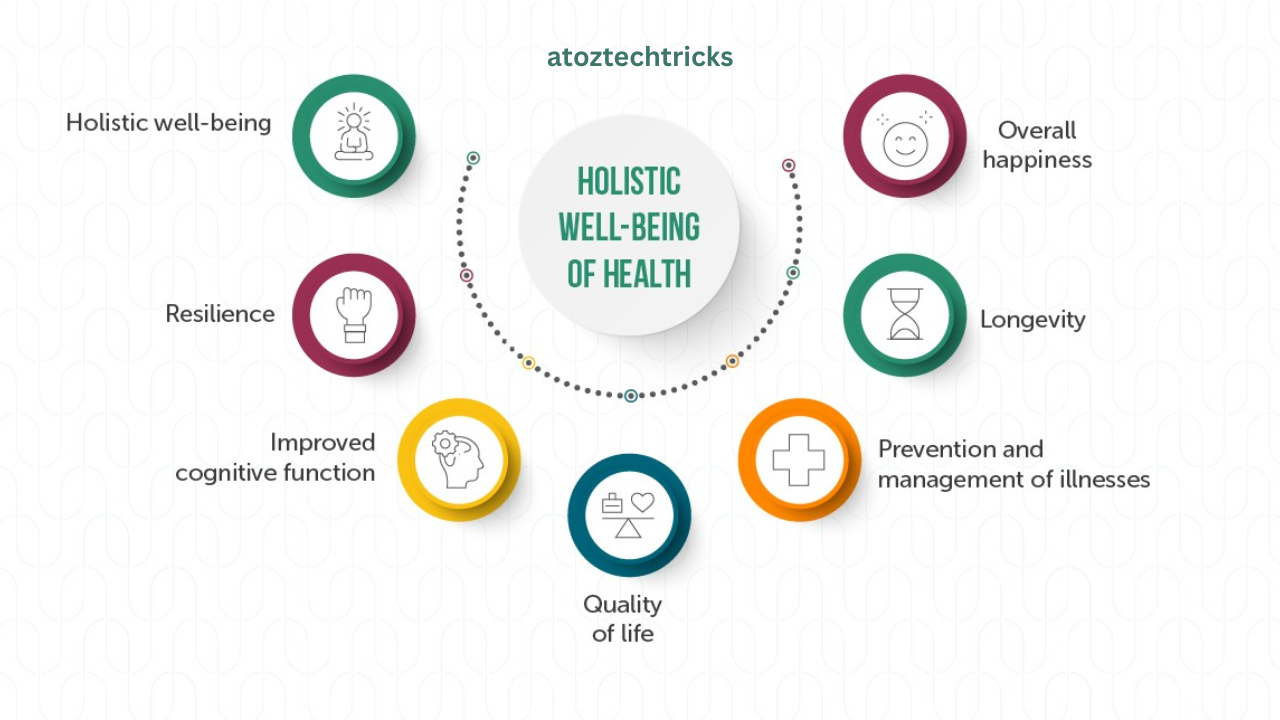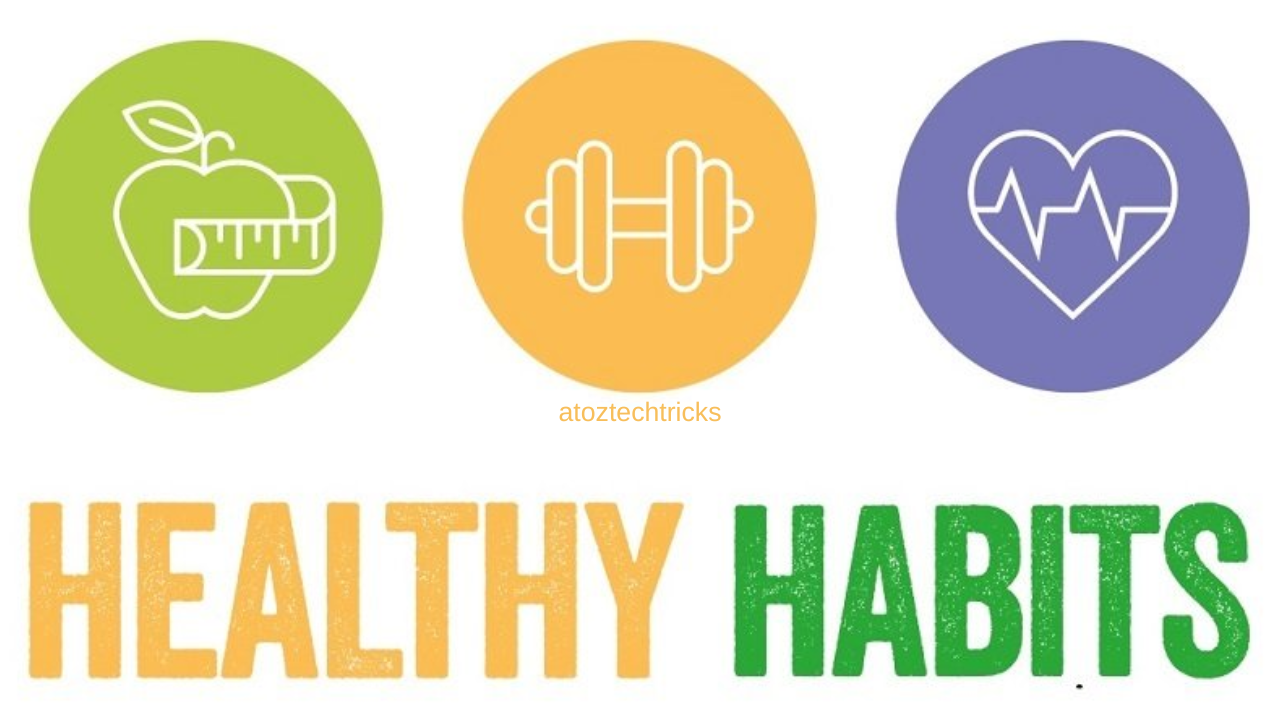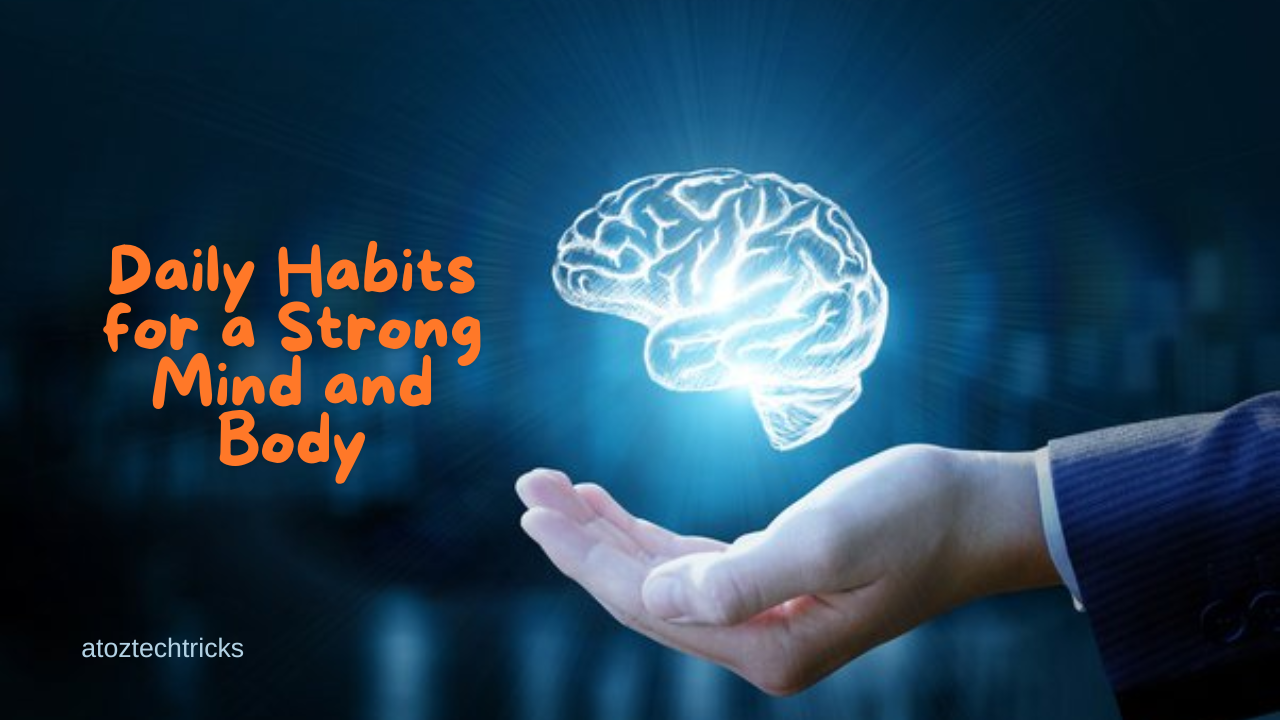Impact of Lifestyle Choices on Holistic Health: A Comprehensive Overview
Holistic health encompasses the overall well-being of an individual, addressing physical, mental, emotional, and spiritual aspects of life. Our lifestyle choices significantly impact this multi-dimensional concept of health. By understanding the interplay between various lifestyle factors and holistic health, we can make informed decisions to enhance our quality of life. This comprehensive guide explores how different lifestyle choices affect holistic health, offering practical strategies for fostering a balanced and healthy life.
1. Understanding Holistic Health
What is Holistic Health?
Holistic health is an approach to wellness that considers the whole person, not just individual symptoms or conditions. It involves a balanced integration of physical, mental, emotional, and spiritual well-being. This approach recognizes that these dimensions are interconnected and that an imbalance in one area can affect overall health.
- Physical Health: Refers to the condition of the body and its systems, including fitness, nutrition, and disease prevention.
- Mental Health: Involves cognitive functions, such as thinking, learning, and memory, as well as mental well-being and the ability to manage stress.
- Emotional Health: Relates to the ability to understand, express, and manage emotions effectively.
- Spiritual Health: Encompasses a sense of purpose, connection, and alignment with one’s values and beliefs.
The Importance of a Holistic Approach
A holistic approach to health emphasizes the importance of balancing all aspects of well-being. It recognizes that a problem in one area can affect others and that achieving optimal health requires addressing the full spectrum of human experience.
- Interconnectedness: Physical ailments can lead to emotional stress, while emotional difficulties can impact physical health. A holistic approach seeks to address these interconnections.
- Prevention and Maintenance: Focusing on overall well-being helps prevent illness and maintain health by addressing lifestyle factors that impact all dimensions of health.

2. Impact of Physical Activity on Holistic Health
Benefits of Regular Exercise
Regular physical activity is crucial for maintaining physical health and has profound effects on mental, emotional, and spiritual well-being.
- Physical Health: Exercise improves cardiovascular health, strengthens muscles and bones, and enhances overall fitness. It also supports weight management and boosts immune function.
- Mental Health: Physical activity releases endorphins, which are natural mood lifters. Regular exercise has been shown to reduce symptoms of depression and anxiety and improve cognitive function.
- Emotional Health: Engaging in exercise can enhance self-esteem and body image. It also provides a healthy outlet for managing stress and emotions.
- Spiritual Health: Many people find a sense of fulfillment and spiritual connection through physical activities like yoga or nature walks, which can foster a deeper connection with themselves and the environment.
Practical Tips for Incorporating Exercise
- Find Activities You Enjoy: Choose exercises that you find pleasurable to increase the likelihood of maintaining a regular routine.
- Set Realistic Goals: Start with achievable goals and gradually increase the intensity and duration of your workouts.
- Include Variety: Incorporate a mix of aerobic, strength, flexibility, and balance exercises to benefit all aspects of physical health.
- Make It Social: Engage in group fitness classes or activities with friends to enhance motivation and enjoyment.
Balancing Physical, Mental, and Emotional Well-Being: A Comprehensive Guide
3. Nutrition and Its Holistic Impact
Role of a Balanced Diet
Nutrition plays a fundamental role in holistic health, influencing physical, mental, emotional, and spiritual well-being.
- Physical Health: A balanced diet provides essential nutrients, supports energy levels, and helps prevent chronic diseases. It also plays a role in maintaining a healthy weight and supporting overall bodily functions.
- Mental Health: Certain nutrients, such as omega-3 fatty acids, vitamins, and minerals, are crucial for cognitive function and mental health. A nutrient-rich diet can improve mood and cognitive performance.
- Emotional Health: Healthy eating patterns can stabilize blood sugar levels and mood. Nutrient deficiencies can lead to irritability and mood swings, affecting emotional stability.
- Spiritual Health: For some, dietary choices are a reflection of personal values or spiritual beliefs. Adhering to a diet that aligns with one’s values can enhance a sense of purpose and spiritual fulfillment.
Tips for Healthy Eating
- Focus on Whole Foods: Prioritize fruits, vegetables, whole grains, lean proteins, and healthy fats over processed foods.
- Practice Mindful Eating: Pay attention to hunger and fullness cues, and savor each bite to enhance the eating experience and prevent overeating.
- Stay Hydrated: Drink plenty of water throughout the day to support overall health and well-being.
- Plan Balanced Meals: Aim to include a variety of nutrients in each meal to ensure you’re meeting your dietary needs.
4. Sleep and Its Holistic Benefits
Importance of Quality Sleep
Sleep is a critical component of holistic health, affecting physical, mental, emotional, and spiritual well-being.
- Physical Health: Quality sleep supports bodily repair, immune function, and overall physical health. Poor sleep can lead to weight gain, cardiovascular problems, and impaired physical performance.
- Mental Health: Sleep is essential for cognitive functions such as memory, concentration, and problem-solving. Insufficient sleep can impair these functions and increase the risk of mental health disorders.
- Emotional Health: Lack of sleep can lead to mood swings, irritability, and increased stress. Adequate rest helps regulate emotions and manage stress more effectively.
- Spiritual Health: Proper sleep contributes to a sense of balance and well-being, which can enhance spiritual practices and overall life satisfaction.
Strategies for Improving Sleep
- Maintain a Consistent Sleep Schedule: Go to bed and wake up at the same time every day to regulate your internal clock.
- Create a Relaxing Bedtime Routine: Engage in calming activities before bed, such as reading or meditating, to signal to your body that it’s time to wind down.
- Optimize Your Sleep Environment: Ensure your bedroom is conducive to sleep by keeping it cool, dark, and quiet.
- Limit Stimulants: Avoid caffeine, nicotine, and electronic screens close to bedtime, as they can interfere with sleep quality.
5. Stress Management and Its Holistic Impact
Effects of Stress on Health
Stress affects all dimensions of holistic health, influencing physical, mental, emotional, and spiritual well-being.
- Physical Health: Chronic stress can lead to a range of physical health issues, including hypertension, heart disease, and digestive problems. It also weakens the immune system.
- Mental Health: Stress can impair cognitive functions, contribute to mental health disorders such as anxiety and depression, and affect overall mental clarity.
- Emotional Health: High stress levels can lead to emotional instability, irritability, and difficulty managing emotions. Effective stress management helps maintain emotional balance.
- Spiritual Health: Persistent stress can disrupt a sense of purpose and spiritual connection. Managing stress effectively can enhance overall spiritual well-being.
Effective Stress Management Techniques
- Mindfulness and Meditation: Practice mindfulness or meditation to reduce stress and improve overall well-being. These techniques help you stay present and manage stress more effectively.
- Physical Activity: Engage in regular exercise to reduce stress and promote relaxation. Activities like yoga and tai chi combine physical movement with mindfulness.
- Time Management: Organize and prioritize tasks to reduce feelings of overwhelm. Break tasks into manageable steps and set realistic goals.
- Seek Support: Reach out to friends, family, or professionals for support and guidance. Sharing your concerns can alleviate stress and provide valuable perspective.
Incorporating Alternative Therapies for Holistic Health: A Comprehensive Guide
6. Social Connections and Their Holistic Effects
Importance of Social Relationships
Social connections play a vital role in holistic health, influencing physical, mental, emotional, and spiritual well-being.
- Physical Health: Strong social ties are associated with better health outcomes, including lower rates of chronic diseases and longer life expectancy. Social support can also encourage healthy behaviors.
- Mental Health: Positive social interactions enhance mental health by providing emotional support, reducing feelings of loneliness, and improving overall cognitive function.
- Emotional Health: Meaningful relationships contribute to emotional stability and happiness. They provide a sense of belonging and help manage stress and emotional challenges.
- Spiritual Health: Social connections can enhance spiritual well-being by fostering a sense of community and shared values. Engaging with others who share similar beliefs can strengthen spiritual practices.
Tips for Building and Maintaining Relationships
- Cultivate Meaningful Connections: Focus on building deep, meaningful relationships with family, friends, and community members.
- Engage in Social Activities: Participate in social events, hobbies, or group activities to connect with others and build a supportive network.
- Communicate Effectively: Practice open and honest communication to strengthen relationships and resolve conflicts.
- Offer Support: Be there for others and offer support when needed. Building strong relationships involves both giving and receiving support.

7. Work-Life Balance and Its Holistic Impact
Balancing Professional and Personal Life
Achieving a healthy work-life balance is crucial for maintaining holistic health. An imbalance can lead to stress, burnout, and negative impacts on physical, mental, emotional, and spiritual well-being.
- Physical Health: Long work hours and high stress can lead to physical health problems, such as fatigue, weight gain, and cardiovascular issues.
- Mental Health: Overworking can impair mental health by reducing time for relaxation, hobbies, and self-care. It can also contribute to mental health disorders, such as anxiety and depression.
- Emotional Health: A lack of balance can lead to emotional strain, relationship difficulties, and reduced overall happiness. Prioritizing personal time helps manage emotions more effectively.
- Spiritual Health: Neglecting personal interests and spiritual practices due to work demands can disrupt a sense of purpose and fulfillment.
Strategies for Achieving Work-Life Balance
- Set Boundaries: Establish clear boundaries between work and personal life. Avoid checking work emails or taking calls outside of work hours.
- Prioritize Self-Care: Allocate time for self-care activities, such as exercise, hobbies, and relaxation, to maintain balance and well-being.
- Delegate Tasks: Delegate tasks at work and home to reduce stress and manage responsibilities more effectively.
- Practice Time Management: Organize and prioritize tasks to maximize efficiency and create time for personal activities.
8. Financial Health and Its Holistic Impact
Managing Financial Stress
Financial health is an integral part of holistic well-being, affecting physical, mental, emotional, and spiritual aspects of life. Financial stress can have a significant impact on overall health.
- Physical Health: Financial stress can contribute to physical health problems, such as high blood pressure, sleep disturbances, and digestive issues.
- Mental Health: Financial concerns can lead to mental health issues, including anxiety, depression, and cognitive impairment.
- Emotional Health: Financial stress can affect emotional well-being, leading to feelings of frustration, helplessness, and reduced overall happiness.
- Spiritual Health: Financial difficulties can disrupt a sense of purpose and spiritual fulfillment. Financial stability can contribute to a greater sense of security and alignment with personal values.
Tips for Improving Financial Health
- Create a Budget: Develop a budget to manage income and expenses effectively. Track spending and set financial goals to improve financial stability.
- Build an Emergency Fund: Save for unexpected expenses to reduce financial stress and provide a safety net.
- Plan for the Future: Invest in retirement accounts and savings plans to ensure long-term financial security.
- Seek Professional Advice: Consult with a financial advisor to develop a comprehensive financial plan and address any concerns.
Lifestyle choices profoundly impact holistic health, influencing physical, mental, emotional, and spiritual well-being. By understanding the interplay between various aspects of lifestyle and holistic health, we can make informed decisions to enhance our overall quality of life.
- Physical Activity: Regular exercise supports physical, mental, emotional, and spiritual health.
- Nutrition: A balanced diet provides essential nutrients and supports overall well-being.
- Sleep: Quality sleep is crucial for maintaining all dimensions of health.
- Stress Management: Effective stress management techniques promote emotional balance and overall health.
- Social Connections: Meaningful relationships contribute to holistic well-being.
- Work-Life Balance: Achieving balance between work and personal life supports overall health.
- Financial Health: Managing financial stress is essential for maintaining holistic well-being.
By prioritizing these aspects of lifestyle and making conscious choices, we can cultivate a balanced and fulfilling life, achieving optimal holistic health.




Post Comment